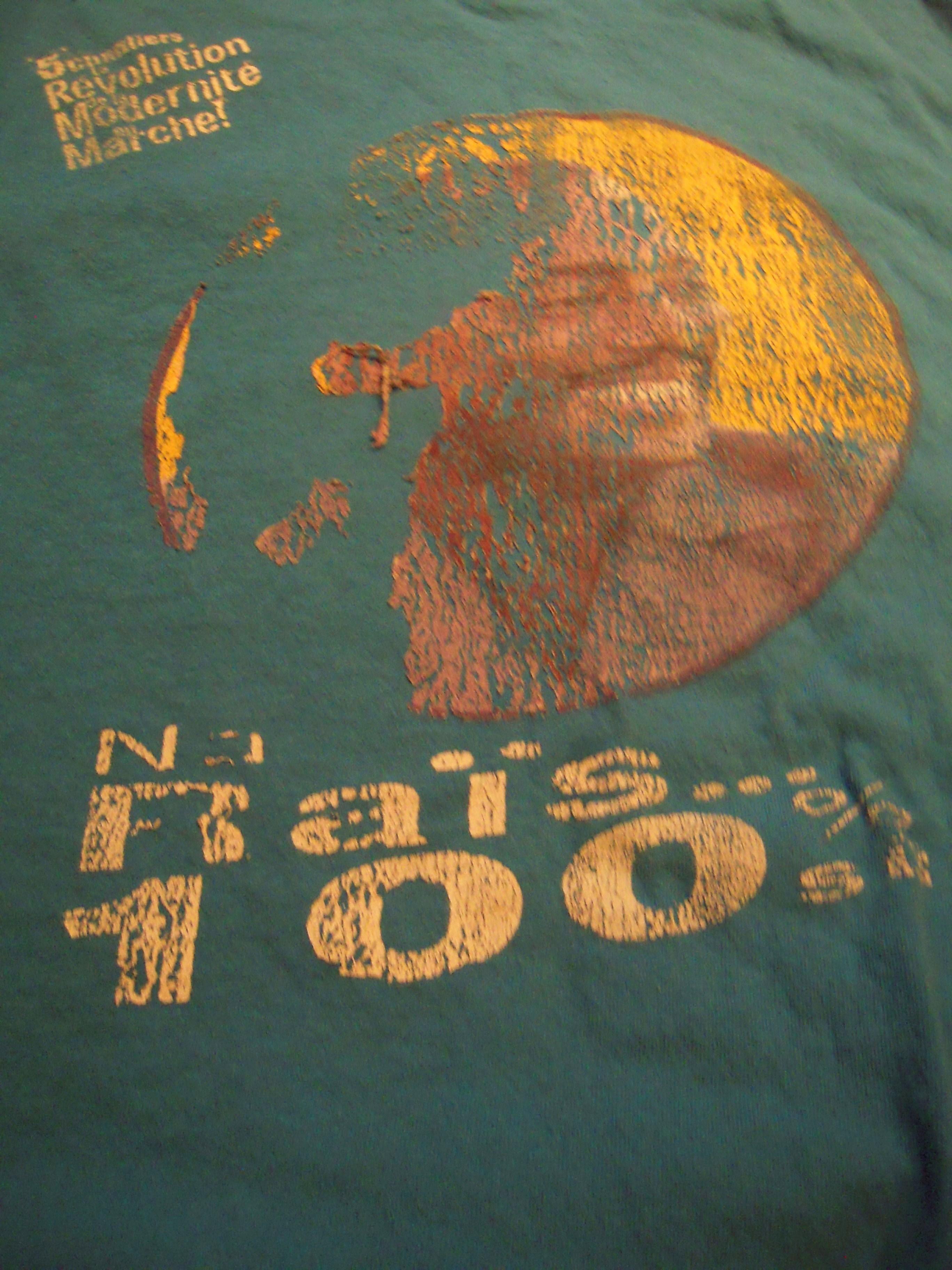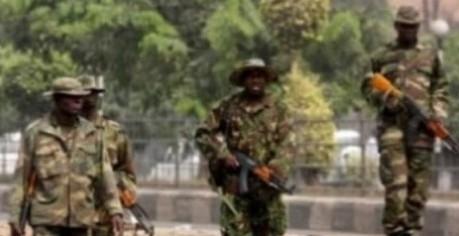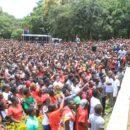Congo: Kabila in a Catch 22 with M23 – By Kris Berwouts

Kinshasa, November 27th 2012
As reported last week, the DRC’s Eastern city of Goma fell on Tuesday November 20th. The next day M23 took Sake, 25 km to the west. Many people now expected this to be the first step in an advance south with the rebels setting their sites on taking Bukavu. But that hasn’t happened (yet). Instead, M23’s military movements turned to the north and the west, consolidating positions in Rutshuru and Masisi. The FARDC has reorganized itself in Minova, the border town between North and South Kivu. At the moment of writing this article, it seems more likely that if M23 is going to take another town then it will most likely be Beni.
This week all eyes were on Kampala – the venue of the regional summit of the International Conference of the Great Lakes Region. The summit on November 25th ended with an agreement which included the withdrawal of M23 from Goma within 48 hours. This did not happen.
Rwandan interests in Congo: 3 phases
My intention here is not to write another overview of recent Congolese history, nor do I intend to reduce the current situation with M23 simply to its Rwandan dimension. However, it is important to remember the joint military operation Umoja Wetu, which took place in January 2009. In this operation, the Rwandan and Congolese armies aimed at dismantling the FDLR, also hoping to put a seal on the new agreement between Congo and Rwanda and on the integration of the CNDP within the Congolese army (FARDC). As such, the agreement was the beginning of a third phase in the way Rwanda defended its interests in Congo.
Phase one
At first, in the wars of 1996-1997 and 1998-2002, Rwanda defended its economic (and other) interests through a direct and open presence on Congolese territory. As part of a complex and fragile peace process, Rwanda officially withdrew its troops in September 2002. Its main ally, the Rassemblement Congolais pour la Démocratie (RCD), joined the transitional government and participated in the 2006 elections. Their soldiers were also integrated in to the FARDC.
Phase two
At the start of the transitional period (2003-2006) a small part of the RCD’s military (under the command of Laurent Nkunda) did not join the newly integrated army. This was part of a “˜plan B’ to prevent the Congolese Tutsi community losing its political weight and military power in the event that transition, integration or elections did not favour them. This was the start of a second phase, where Rwanda did not have an open and visible presence in Congo, but where it gave military support to the rebel movement to protect its interests and to maintain its impact on Congolese politics.
2008 was a bad year for both Kagame and Kabila. In addition to the difficulties created by the arrest warrants for nearly the entire RPF leadership (except Kagame) by the judges, Bruguií¨re (in France) and Andreu (in Spain), Rwanda was engaged in a painful argument with the EU over the publication of the observation report on the September 2008 legislative elections. In December of the same year the UN experts’ report was published, with plenty of detail on Rwandan support for Laurent Nkunda’s CNDP.
Joseph Kabila, powerless, and with his phantom army facing the CNDP backed by Rwanda, had requested military help. The African Union, Southern African Development Community (SADC), European Union and individual countries such as Angola had, among others, considered sending troops, but ultimately nobody came to his aid.
Umoja Wetu was a marriage based neither on love nor common interests, but rather on the lack of other options for both partners. Kabila had become isolated in the face of a humiliating political and military situation, whilst Kagame had few other options as he was confronted with a change in attitude on the part of some of his most loyal international partners who had formerly supported him, almost unconditionally.
Phase 3
With this loveless marriage, the Rwandan policy to defend its interests in Congo entered a third phase, a phase of partnership. The rapprochement between Congo and Rwanda created an opportunity to strengthen regional frameworks and initiatives in the belief that the complementary nature of the countries of the region could be enhanced and shared interests could be developed and contributed to a common identity.
Rwanda would still be able take advantage of the unequal balance in the regional structures between itself as a strong state and Congo, which remained very fragile. The exploitation of Congo’s mineral resources also remained crucial for Rwanda’s national budget as well as for the personal wealth of its political and military élite. But, aware of the weakness of the Congolese administration, the feeble steps taken against corruption and the porous nature of the frontiers, Rwanda continued to try to maximize its profits from the exploitation of Congo’s natural resources.
An arranged but stable marriage
But somehow it worked. The east became a bit more stable, even if insecurity did not entirely disappear. With the elections in view, Kagame became Kabila’s most reliable ally. Kabila knew that his army would never be able to maintain the necessary stability in the east of Congo. Kagame seemed to be the only person who could keep the violence in Kivu at a manageable level.
Kagame also needed this good relationship with Kabila to continue in order to prevent military action against his regime taking shape on Congolese soil. That became particularly relevant in March 2010, when General Kayumba Nyamwasa fled via Uganda to South Africa. Kayumba Nyamwasa belonged to the inner circle of Kagame’s regime, a “˜companion de route’ going back many years, and a key player on some of the most important dossiers, including the plundering of Congo. Very soon after his defection, it became clear that Kayumba, probably with the support of Museveni, made contact with a number of armed groups in Congo to investigate if a broad anti-Kagame coalition could be set up. However, no operational military framework to fight Kagame ever materialized.
The improved relationship between Kagame and Kabila turned out to be advantageous for both men. In December 2010 the CNDP joined the Alliance de la Majorité Présidentielle, Kabila’s political coalition for the elections. In some parts of North Kivu CNDP locked up the political space to keep opposition candidates from campaigning.
But for Kabila there was a price to pay. A lot of the military people in Kivu had difficulty in understanding why and how the CNDP, who for many years were their worst enemies, became their superiors in rank and had gained control over more soldiers, a much bigger area and more mineral resources than ever before.
The civilian population had to face a CNDP which behaved very arrogantly and felt they were above the law. When Vital Kamerhe, former president of Parliament, left Kabila’s party in December 2010 and founded a new opposition party, it was immediately clear that a considerable part of the Kivutian electorate would follow him.
Kabila’s dead end street
Kabila’s unfortunate current position has a lot of similarities with the situation in 2008. His government wasn’t able to convince people in the east of Congo of its capacity or even ambition to tackle the root causes of the conflicts in the region. His army has no chance against M23 with open support from Rwanda.
Rwandan support to M23 has made it clear that Kabila has lost his most reliable ally since 2009. An important part of the public opinion is certain to disagree with any negotiations and nobody will believe that they could lead to a credible solution and sustainable peace. But refusing to negotiate will further marginalise him on the regional and international political scene, and will increase the military pressure.
This situation, especially after the fall of Goma, has had a negative impact on the development of the institutions the country has been trying, since 2006, to put back together. It has also humiliated Kabila the man, as well as the office he holds. Some people I have talked to believe that the main strategy of M23 is to maintain the pressure on Kabila by keeping control on one or more major towns in the east. Despite the deadline to leave Goma, M23 remains in town. Each day this continues Kabila loses a bit of his dignity and credibility as a leader, and people might soon start asking the question, “what’s next?”
So far, the opposition has not given much evidence of possessing a potential alternative leadership. They couldn’t convince before, during and after the presidential and parliamentary elections. It seems unlikely that they would provide the necessary backbone to the nation and the state in the case that the regime collapses.
The army is even more problematic. It is often presented as a heterogeneous, undisciplined, badly trained amalgam of different militia. To a great extent this is true, but it also masks a more complex reality.
Broadly, there are three generations within the military leadership:
- The elder officers with a Mobutian background, which means that they had proper training and a proper military career. Although they were a part of a kleptocratic regime, they do have a military deontology.
- The youngest generation contains the people who followed programmes and training as part of the security sector reform accompanied by several western and African countries. As a group, this generation has potential.
- In between those generations, there is a huge group of people who made their career somewhere in the military landscape of a decade and a half of fighting between irregular armed groups, without proper training or ethics.
The scheme is further complicated by regional alliances and interest groups within the army. Parts of the existing armed forces never truly integrated, but kept the loyalties (and sometimes the informal chains of command) they had during or just after the war.
I don’t exclude the possibility that individuals or groups within the army might, at some stage, be attracted by a putsch scenario. But the chances that such an initiative would restore public order and efficiency, end corruption, protect civilians and put the democratic and peace processes back on track is far below zero. It would simply cause an implosion of the country.
Throwing back the peace process several years
Joseph Kabila started 2012 very bleakly by winning a second mandate as president of the third Republic, after controversial elections. He appointed a government with a rather technocrat image, led by Prime Minister Matata Ponyo, who was responsible for some of the macro-economic successes of the previous government, where he served as the Minister of Finance.
This was a good move, and was well accepted by an important part of Congolese and international public opinion. It created a bit of space to solve the problems within and between the majority and the opposition, and it gave people the feeling that the state was been taken care of.
But things have turned out differently. The rebellion of M23, the way Rwanda has supported it and the fact that Goma has been taken, throws the peace process back several years. The elections of 2006 and 2011 initiated a slow and gradual evolution where Congolese politics became an area for politicians rather than for soldiers, rebels and warlords. Diplomacy had replaced arms as the main tool to settle problems between countries. All this has been reversed by the recent events in North Kivu. And every day it takes, it affects the credibility of the president and the country’s institutions.
I very much hope that M23 will keep its promise to leave Goma before the end of the week.
Kris Berwouts has, over the last 25 years, worked for a number of different Belgian and international NGOs focused on building peace, reconciliation, security and democratic processes. Until recently, he was the Director of EurAc, the network of European NGOs working for advocacy on Central Africa. He now works as an independent expert on Central Africa.






Kris,
It should be clear by now. Neither Kabila, nor anybody else sitting in Kinshasa is ever going to be able to control Kivu. As you also show, M23 is a group that is dominated by Tutsi nationals and receives support from Rwanda.
The opponents of M23 are not mainly Kabila or the Congolese army – because they are not effective in the area. They are, rather, the Hutu-led FDLR rebel group. Thus, it is safe to say that the M23 rebellion is, if nothing else, another expression of the bitter and tragic Hutu -Tutsi conflict that has caused so much damage in Rwanda, Burundi and Eastern Congo in the past decades.
This means that a solution for the rebellion cannot be found in Kinshasa. M 23, together with the major part of the international community, are mistaken when they believe that a solution can be negotiated within the framework imposed by the current boundaries in the region.
Would it not be better to join those parts of North Kivu with a Rwanda-Rundi speaking majority to Rwanda and those parts of South Kivu with a Rwanda-Rundi speaking majority to Burundi?
Of course, the Hutu and the Tutsi are considered to be one ethnic group and they have lived together for centuries. Given the recent history, however, it is very hard to imagine how they can live together ever again. It is being tried: both Rwanda and Burundi are, in theory, multi-party states with no dominant ethnic group. However, most observers concede that both countries are, in fact, currently Tutsi-dominated. Thus, it seems only a matter of time before violent conflict erupts again either in Rwanda or in Burundi or in both countries.
It might be a much better solution if there would be two separate states, one in which the Hutu is clearly the dominant group, one in which the Tutsi are. Perhaps Rwanda and Burundi should consider joining forces and becoming a federation. Perhaps North and South Kivu, or large parts of it, could do the same and become an independent country.
In a way, this would be similar to Croatia and Serbia in Europe. The Croats and the Serbians think they are very different from one another – but they are the only ones who think so. They also think they speak different languages – although they understand one another perfectly.
The two-country solution has worked for the Croats and the Serbians. It could work as well for the Hutu and the Tutsi. Breaking the taboo on this subject is the only way forward and the quickest way of avoiding another decade of turmoil and misery in the region.
Of course, it would be a difficult route, difficult also for the country that is now called Congo. But I am convinced that it would also be the only constructive route.
Kris, you must have thought about this as well. What are your views?
[…] back the M23 rebel group. This line becomes thinner each time they use it. Kris Berwouts provides a succinct analysis of the recent Rwandan/Congolese […]
This way of simpleminded the Kivu Rwanda invasion will never work as Natives of the big Kivu would never accept to be incorporated in Rwanda or in whatsoever scheme to create another State in the region.Soon or later they will stand up!The Tutsi knows this for years.Hence they are busy cleansing out the other indigenous tribes for space and gain! Laurent Kabila sensed this machiavellic scheme,and tried to chase Tutsi out of Congo,hence up to date He has not being forgiven!la lutta for occupation continue under the naivety of his son! this state of affair is Common and recurrent in the Human History,the best remedy for the state invaded is to fight back, as in Human deviousness,war beget peace for those nations which did accept domination!Otherwise the all earth will end up at intervals,by being re partitioned according to the whims of dictators.After all Hero are made out of conflicts.
[…] Kinshasa, November 27th 2012 As reported last week, the DRC’s Eastern city of Goma fell on Tuesday November 20th. The next day M23 took Sake, 25 km to the west. Many people now expected this to be the first step […]
[…] pessoas que lhes são queridas a elas, correm-nos ainda. Entretanto, relatam-se factos e apontam-se argumentos, criticam-se inacções, mostram-se imagens e apontam-se soluções, mas não sei até que ponto […]
Anthony,
Are you saying that the Tutsi are bad and that the best remedy is to fight back? What a great idea! Perhaps it would be even better to kill everybody in the area, to put a fence around it and declare it a nature reserve.
The only way to ever get to peace is to respect the rights of the people living in the area. Of course this should include the rights of those who are not Hutu or Tutsi. But it should also include the Tutsi. If you don’t want this – then the misery will only continue.